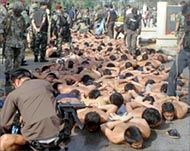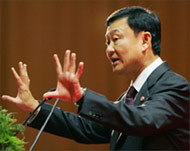Thai PM criticised as unrest grows
Five people have been killed in southern Thailand amid continued criticism of the government over the mass suffocation of Muslim demonstrators while in police custody.

A police officer, two agricultural workers, a construction worker and a former village headman in Cho-ai-Rong district of Narathiwat province were killed by unknown assailants in separate incidents, according to police.
An officer said: “Initial suspicions are that it is part of the unrest.”
The latest deaths bring to at least 11 the number killed in the south by bombings and shootings since Thursday evening.
Thailand‘s five million Muslims and Muslim groups around the globe have been outraged by the deaths of 78 men last Monday, who suffocated after being crammed into army trucks for a three-hour journey to military barracks in the Pattani province last week.
Another seven died from wounds suffered when security forces fired live rounds, tear gas and water cannons to suppress protesters calling for the release of six detained villagers at the Tak Bai police station.
Many detainees have criticised the way the authorities dispersed the demonstration and transported the Muslims, who were fasting during Ramadan.
One man in his mid-20s said he was tied with his hands behind his back and had five layers of other detainees on top of him in a truck.
“Every time we lifted up our heads, soldiers stepped on them,” another detainee said.
At the end of his journey to the Pattani army base, which took five hours, four of his fellow detainees were dead, the Nation newspaper quoted him as saying.
Reluctant to talk
Usan Asae, one of the freed men, said: “I was returning home from work and was rounded up by the authorities. It was a case of being in the wrong place at the wrong time.”
 |
|
Demonstrators have condemned |
Usan was reluctant to talk about his treatment at the hands of security forces, who stood nearby as he and others were reunited with relatives.
Against this backdrop of tension, the Thai government said it has scrapped plans for face-to-face talks with a leader of one of the separatist movements and suspended a $306 million aid package for the region.
Earlier, Thai Prime Minister Thaksin Shinawatra sacked his defence minister because the violence had not been quelled.
General Chetta Thanajaro had been appointed only seven months earlier in another shuffle triggered by the southern crackdown.
Saneh Chamarik, the commission chairman, said it was obvious that human-rights violations had occurred.
The government needs to “re-examine the whole policy and attitude towards the south”, he said.
“They need to give a certain degree of rights and liberties to the people there,” Chamarik said.
In a stinging open letter to Thaksin, the US-based Human Rights Watch said “security forces trample the rule of law and violate human rights without fear of accountability”.
Excessive force
“Since your government assumed power, Thai security forces have increasingly used excessive force and operated with impunity, particularly in southern Thailand,” wrote the group’s executive director for Asia, Brad Adams.
 |
|
Rights groups say Thai forces act |
Policies adopted by Thaksin since he came to power in 2001 have often worsened the problems in the Buddhist kingdom’s Muslim areas, Thitinan Pongsudhirak, a lecturer at Bangkok’s Chulalongkorn University, said.
“A long string of tough strategies and harsh tactics since January have failed time and again, and have only inflamed the tensions down south,” he wrote in a blistering opinion piece in the Bangkok Post.
“Separatism is a political problem which merits a political solution, not just soldiers, guns and curfews.”
Muslims in the poor and underdeveloped south, which borders Malaysia, have long complained that the faraway Bangkok administration is insensitive to their culture and religion.
Vinai Sama-oon, vice chairman of Thailand‘s Islamic committee, said in The Nation newspaper that Thaksin’s attitude made it difficult to solve the problems.
“Martial law is not working, and as long as the prime minister sticks to the use of force, the problems won’t go away,” he said.
Credibility questioned
Under intense international and domestic pressure, Thaksin announced an independent inquiry into Monday’s deaths.
 |
|
Thaksin initially praised security |
He had first insisted his security forces acted within acceptable bounds, but later expressed regret at the deaths and vowed to compensate families of the victims, stopping short of a public apology.
The prime minister had also initially praised his security forces on 28 April, a day regarded as the worst for bloodshed in the area’s modern history. It saw government troops kill 108 people, many in a 16th century mosque.
An inquiry after the April massacre found that the force used by security personnel was disproportionate but no legal action was taken.
Thaksin has, however, launched another government inquiry into the deaths amid domestic and international pressure.
There have been no further details of the new probe.
A member of the human rights commission delegation, who did not want to be named, said there was deep concern about the way the government’s investigation was being run.